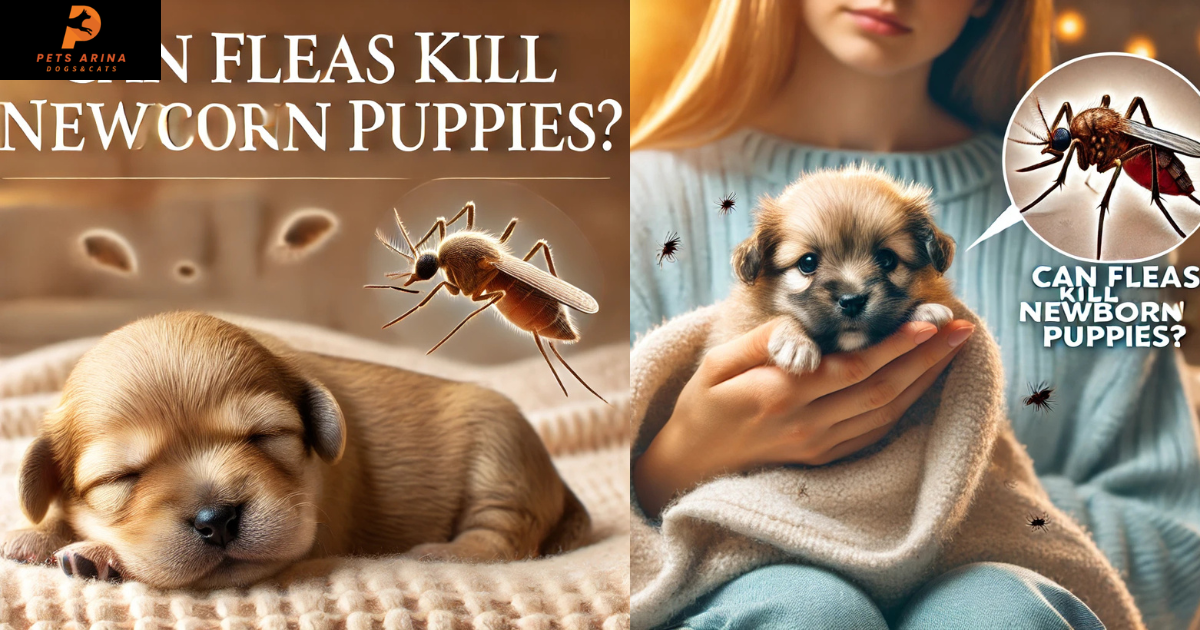Have you ever heard about fleas or had to deal with fleas before? Fleas are one of the most common parasites that can harm your pets, especially cats and dogs. Their bites not only cause discomfort but can also lead to serious health issues in puppies. Fleas are ectoparasites that live on the blood of their host, affecting your pet externally and internally.
Newborn puppies are particularly vulnerable to fleas due to their underdeveloped immune systems. Flea bites can cause itchiness, rashes, and even anemia in severe cases, making it essential to protect them. This article provides everything you need to know to keep fleas off newborn puppies and ensure their health and safety.
Read Also:
How To Tell If Dogs Anal Glands Are Full
Is The Samoyed Really Hypoallergenic?
What Are Fleas?
Fleas are tiny, wingless insects classified as ectoparasites. They survive by feeding on the blood of animals such as dogs, cats, and even humans. These parasites are known for their ability to reproduce rapidly, creating infestations if not controlled. Fleas can also transmit diseases like tapeworms and flea allergy dermatitis (FAD).
Fleas on Newborn Puppies
Newborn puppies are an ideal host for fleas due to their warm body temperature and delicate skin. Fleas lay eggs on puppies, causing severe irritation and health problems. The following issues can arise:
- Skin irritation and itching.
- Anemia from excessive blood loss.
- Restlessness and discomfort due to flea activity.
Newborn puppies are extremely sensitive, so traditional anti-flea products may be too harsh for their skin. It’s crucial to use safe, vet-recommended methods for flea control.
Are Puppies Born with Fleas?
No, puppies are not born with fleas. However, they can become infested shortly after birth if the mother or environment has fleas. To prevent this, ensure the mother is flea-free and keep the puppies’ surroundings clean and sanitized.
Symptoms of Flea Bites in Dogs
Below are some common symptoms of flea bites in puppies:
| Symptom | Description |
|---|---|
| Skin Irritation | Continuous scratching, redness, and visible rash. |
| Flea Allergy Dermatitis | Severe itching caused by an allergic reaction to flea saliva. |
| Flea Dirt | Black specks (flea excrement) visible in the fur. |
| Anemia | Weakness, pale gums, and lethargy due to blood loss. |
If you notice these symptoms, consult a veterinarian for proper treatment.
Steps to Protect Puppies from Fleas
- Bathing: Gently bathe puppies in warm water. Avoid harsh shampoos; instead, use mild, puppy-safe products.
- Brushing: Use a flea comb to remove fleas, starting from the neck and working down.
- Dispose of Fleas: Crush fleas or place them in boiling water after combing.
- Clean the Environment: Wash bedding and sprinkle baking soda on surfaces to dehydrate flea eggs and larvae. Vacuum thoroughly the next day.
- Treat the Mother: If the mother has fleas, consult a vet for safe treatment options to prevent reinfestation.
Home Remedies for Fleas on Newborn Puppies
For puppies under eight weeks old, these natural remedies can help eliminate fleas safely:
| Remedy | How It Works |
|---|---|
| Apple Cider Vinegar Spray | Acts as a natural flea repellent when diluted with water. |
| Lemon Spray | Made by steeping lemon slices in hot water overnight. |
| Coconut Oil | Repels fleas and soothes irritated skin. |
| Baking Soda | Dehydrates fleas and eggs when applied to surfaces. |
Note: Always use remedies cautiously and monitor your puppy for any reactions.
Safe Flea Treatments for Puppies
Some flea treatments are safe for puppies under veterinary guidance:
| Product | Type | Minimum Age |
|---|---|---|
| Revolution® | Topical, monthly | 6 weeks or older |
| Credelio® | Oral, monthly | 8 weeks or older |
| Simparica Trio™ | Oral, monthly | 8 weeks or older |
| Advantage Multi™ | Topical, monthly | 7 weeks or older |
| Sentinel Spectrum® | Oral, monthly | 8 weeks or older |
Consult your vet before using any flea treatments, especially for puppies under eight weeks old.
Steps to Remove Fleas Outside the Home
Fleas often live and breed in outdoor areas. To minimize infestations:
- Trim Grass: Keep your lawn short to reduce flea hiding spots.
- Clean Debris: Remove leaves, branches, and clutter from your yard.
- Seal Entry Points: Prevent wildlife from accessing crawl spaces or attics.
- Treat the Yard: Use flea sprays or diatomaceous earth in high-risk areas.
Conclusion
Newborn puppies are vulnerable to fleas, making prevention and prompt action critical. Regular cleaning, natural remedies, and vet-recommended treatments can protect your puppies and ensure their well-being. By maintaining a clean environment and treating infestations effectively, you can keep your puppies safe and healthy.
FAQs Can Fleas Kill Newborn Puppies
- What is the most effective method to prevent fleas in puppies?
Answer: Consult your vet for safe treatments and keep your puppies’ environment clean. Natural remedies like coconut oil or baking soda can also help. - How can I tell if my puppies have fleas?
Answer: Look for excessive scratching, visible fleas, or flea dirt (tiny black specks) in their fur. - Are there any flea treatments safe for newborn puppies?
Answer: Newborn puppies are too young for most treatments. Use natural remedies like apple cider vinegar or coconut oil, and consult your vet. - What should I do if the mother dog has fleas?
Answer: Treat the mother with vet-recommended medications and clean the puppies’ environment to prevent reinfestation. - Can fleas cause anemia in puppies?
Answer: Yes, severe flea infestations can lead to blood loss, causing anemia. Look for pale gums and weakness as warning signs. - How do I treat fleas in my yard?
Answer: Trim grass, remove debris, and use pet-safe flea sprays or diatomaceous earth to eliminate fleas outdoors.















